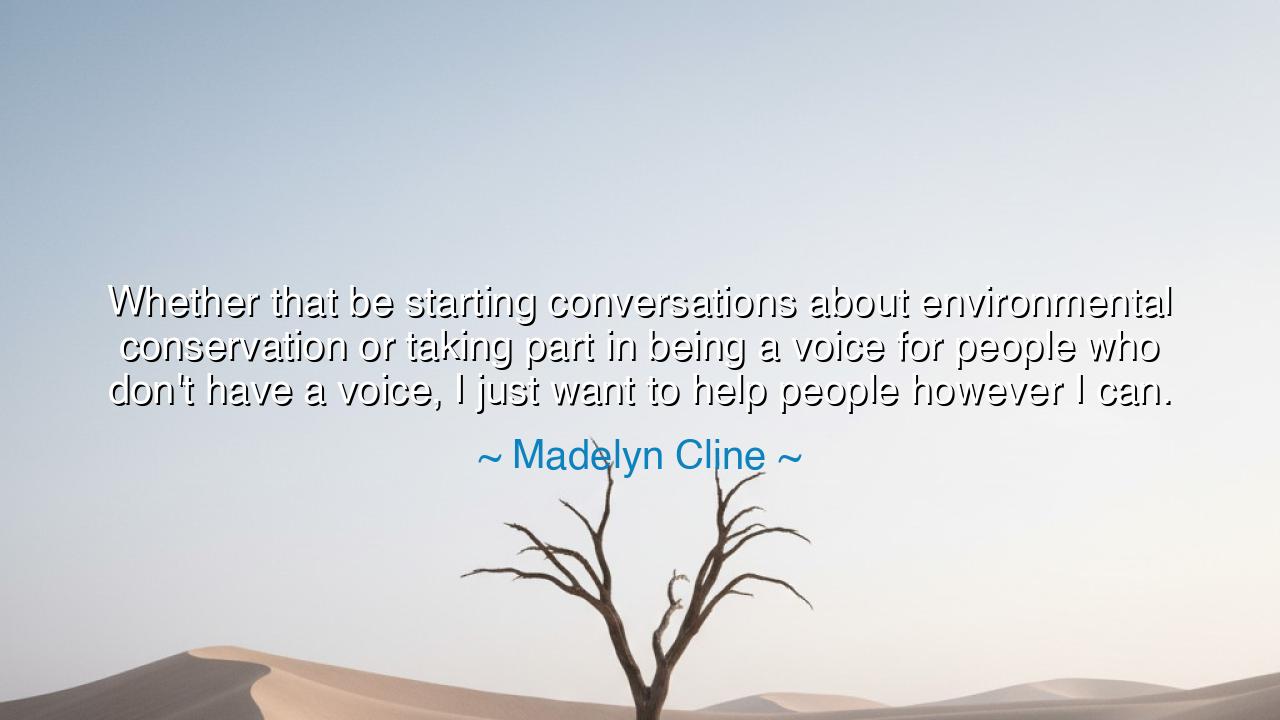
Whether that be starting conversations about environmental
Whether that be starting conversations about environmental conservation or taking part in being a voice for people who don't have a voice, I just want to help people however I can.






Madelyn Cline once spoke with the quiet strength of one whose heart leans toward service: “Whether that be starting conversations about environmental conservation or taking part in being a voice for people who don’t have a voice, I just want to help people however I can.” At first, these words may sound simple, even ordinary, yet they echo a timeless calling: that the true measure of life is not what one gains, but what one gives. In her humility, she places herself not above others, but beside them, as one willing to lift, protect, and speak for those who cannot.
To begin with conversations about environmental conservation is no small thing. For words, when spoken with conviction, are seeds. They fall upon the soil of human hearts, and in time they grow into action. The ancients knew this well. The philosophers of Greece gathered in the agora, speaking not only of abstract truths but of how men should live with the earth and with each other. In the same way, Cline reminds us that to speak of conservation is already to act, for awareness is the first step toward change.
Yet her calling does not end with the earth; it extends also to humanity. To be a voice for those without one is to step into the role of the advocate, the defender, the protector. In every age, there have been those silenced by power, poverty, or oppression. And in every age, there have been others who chose to speak on their behalf. Moses stood before Pharaoh for his people. Abraham Lincoln spoke freedom into the ears of a divided nation. Malala Yousafzai lifted her voice for girls denied education. Each of these lives embodied the truth that to speak for the voiceless is among the highest forms of courage.
Cline’s words, though not uttered from a throne or battlefield, carry the same spirit. She does not boast of greatness but of willingness: “I just want to help people however I can.” This humility is powerful, for it strips away the illusions of grandeur and reveals the essence of service. The ancients taught that greatness begins in the heart ready to serve, whether in small deeds or great. To give water to the thirsty, to give hope to the despairing, to protect the earth from harm—each of these acts is a brick in the foundation of a better world.
The beauty of her confession lies also in its universality. Not all can lead nations or shape empires, but all can help people in some way. A kind word may save a spirit from despair. A small act of stewardship may protect a corner of the earth. A single voice raised in truth may echo into generations. The point is not the size of the deed but the spirit of compassion that drives it. In this, Cline’s words serve as a reminder that service is not beyond reach; it is at hand in every choice we make.
The lesson, then, is clear: let each of us become both guardian of the earth and voice for the voiceless. Begin with conversations in your family, your community, your workplace. Speak of conservation, speak of justice, speak of dignity. And more than speaking, act: recycle, reduce waste, protect forests, support those in need, stand beside the oppressed. In this way, you honor the wisdom of the ancients and the vision of the future alike.
So remember these words of Madelyn Cline as you walk your path: you need not be mighty to do mighty things. Choose compassion, choose courage, choose service. Whether through defending the earth or uplifting the silenced, make your life a gift to others. For in helping people, you not only shape their destiny—you shape your own, and you leave behind a legacy as enduring as the stars themselves.






AAdministratorAdministrator
Welcome, honored guests. Please leave a comment, we will respond soon